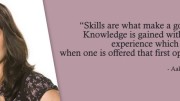Writing well is important in any job, but it is crucial to the conduct of professional public relations. To write well for PR purposes – i.e., to create effective news releases, proposals, reports, blogs, editorials, speeches — practitioners must have a good vocabulary and understand the basics of sound grammar, syntax and style. More substantively, they must know how to use words that will communicate successfully with media, employees, consumers, investors, and other target audiences. They don’t have to be great writers but they do have to be above average.
After more than 30 years of writing and teaching writing, I am convinced that the key to better writing for most PR professionals lies in the answer to the joke about the tourist on the street who asks an NYC local how to get to Carnegie Hall. “Practice, practice, practice,” replies the wise-guy. In other words, you learn by doing, day in and day out. The other key is competent, committed PR managers who want their organization’s writing to be top notch. Their job is to enable their staff to write better.
Working together, management and staff can improve writing significantly. In the process, they can help each other save writing and editing time, increase individual and group productivity, encourage positive attitudes and relationships, and generate more credible, target-friendly results for clients.
To build the necessary dynamic takes a little work at the outset – the old 80/20 rule — but the payoff is well worth the effort in most instances.
How to Get Started
As Employer
> Establish an organization-wide initiative to improve the writing of professionals and/or non-professionals, especially those with the least experience. Base it on the views and opinions of staff as well as management. Survey what each party wants and transform the findings into a workable plan with goals, responsibilities, timetable, evaluation metrics, and other requirements.
> Create a modest program to reward PR writing excellence (e.g., once a month select the best release or best pitch, and announce it publicly, perhaps with a small gift – lunch on the company or an early day off). Explain the choice. Maybe ask staff to make the final pick. The program should encourage healthy competition but respect different skill levels. Done appropriately, it can be fun as well as educational.
> Start a modest study program to encourage self-development as well as group participation (e.g., once a month assign an article to staff on a particular PR writing challenge, then get together over a free-pizza lunch to discuss the implications and solutions). On occasion, invite a guest speaker, give a short multiple-choice quiz, analyze a news release from Bad Pitch blog, read a chapter in Strunk and White’s “Elements of Style” or Richard Lanham’s “Revising Prose,” both short and sweet, or make up your own exercises. A study program will reinforce best PR writing principles and practices and build ownership in making improvements for all concerned. Both staff and management can take turns leading and/or moderating sessions.
As Manager
> Support your agency’s or company’s writing initiative wholeheartedly. Make your support vocal. Don’t hide it.
> Empower your staff to level with you about your editing and writing assistance. Ask them what you can do differently to assist them in improving their writing. And act accordingly. Don’t just tell your staff they’re wrong. Guide them. Give them the benefit of the doubt until you have serious reason not to.
> Edit less on paper and more face-to-face. Don’t spend a lot of time copyediting or rewriting what your staff creates. Instead, give concise suggestions for corrections and changes; e.g., find a stronger lead, shorten to one page, cut hyperbole, minimize adjectives, create a substantive quote, rework, rewrite, resubmit. And tell them what’s good about what they’ve written; e.g., nice quote, strong sentence, great paragraph, terrific lead, nice logic. Make them do the work but encourage them to do much better. Most of my writing workshop participants tell me they feel “forced” to write the way the boss or client wants them to. This is understandable but undermines good writing. Worse case, the writers “turn off.” They take the easiest way out. They do what they’re told.
> Include writing skill in your staff evaluations. Make it an appropriate part of your criteria for raises, bonuses, promotions. Highlight it in job descriptions. Ask for it in your job applications. Make it clear wherever and whenever you can that good writing is valued and expected. Compared with getting account work done, keeping clients happy, producing ink and other benefits, and generating business, it’s not the most important PR job skill but it’s an essential aspect of being a successful PR practitioner in any circumstance. Its manifestation in your news releases, pitches, emails, slide decks, presentations, proposals and other documents is often a measure of intelligence, knowledge and skill to recipients.
As Writer
> Take responsibility for your writing. Work with your managers to improve it in keeping with their expectations as well as yours. Talk to them. Find out what they want and why. But don’t simply acquiesce. Tell them what you want. Discuss areas of disagreement, alternative approaches. Have a dialogue, not an argument. Make constructive suggestions. Take advice graciously. Make changes as appropriate. Thank those who help you.
> Assist your colleagues. Help them in thinking through what they have to write before and as they write. Edit their work if they’ll let you and ask them to do the same for you. All writers need editors. Without them, no one’s writing gets better. Be specific about what you want; e.g., check spelling; review for logic and sense; improve quote; see if anything obvious is missing. Without direction, reviewers will assume you want a wholesale critique.
In the end, concerted action by employers, managers and staff is the key to empowering PR writing. The first step is to do something concrete to get the ball rolling. There’s no better place to begin then where and with whom you work.








Be the first to comment on "Empowering PR Writing: The Management Dynamic"